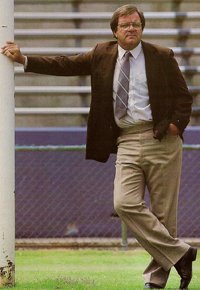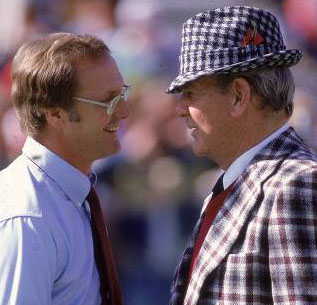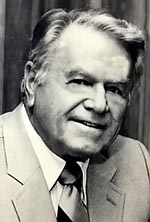LSU Short Story
Bob Brodhead, Former LSU Athletic Director: Sacked! The Dark Side of Sports
at Louisiana State University (1987)
at Louisiana State University (1987)
I am convinced that one of the primary reasons I was hired by LSU was to fire Head Football Coach Jerry Stovall.
Named head coach prior to the start of the 1980 football season, Stovall was arguably the most popular athlete to come out of LSU over the past fifty years. As an offensive halfback and defensive safety for the 1959-62 Tigers, Stovall earned a number of impressive distinctions, including All-SEC in 1961 and '62 and SEC Player of the Year; unanimous All-America and Heisman Trophy runner-up in 1962. ...
In Stovall's inaugural season as coach of the Tigers, the team finished 7-4. The following season, Tiger fans suffered through the worst record posted by an LSU football team in the past quarter-century: 3-7-1.
Not known for its collective patience, the Administration had quickly grown tired of the roller coaster ride. But it was aware of Stovall's popularity and was reluctant to involve itself in the controversy that firing him was sure to cause.
Whoever relieved Stovall of his coaching duties would undoubtedly incur the wrath of a large regiment of north Louisiana fans as well as that of a powerful group of Baton Rouge businessmen who had grown accustomed to the top-shelf treatment they had received as long as their man was in the cat-bird seat.
And so, caught between the proverbial rock and a hard place, the Administration had sought to hire an Athletic Director who, number one, was an experienced businessman capable of restoring order to the financially decimated Athletic Department; two, was capable of making tough decisions in a timely manner; and three, was a knowledgeable football person who could ultimately pull the plug on the popular Stovall.
Enter Bob Brodhead.


L-R: Bob Brodhead, Jerry Stovall and Bear Bryant, Carl Maddox
When Stovall called me at my home in Florida to express his views on my "we will win immediately" remarks to the Board of Supervisors, I knew there would be trouble in Red Stick city.
As I would soon find out, the football coach at LSU had historically ruled the roost, making all decisions relevant to his program. Former Athletic Director Carl Maddox was once overheard to say that he was Athletic Director of everything but football. Judging by my phone conversation with Stovall, he obviously hoped the new A.D. would continue the tradition.
Before I had set a foot on the LSU campus, the local press was predicting a head-on confrontation between the Head Coach and the "brash Miamian" who had dared to question the Athletic Department's sacred cow, football.
Despite the predictions, I didn't hit town looking for a fight with Stovall. On the contrary, I had been handed two mandates by the Board of Supervisors upon accepting the job, and I needed Stovall's help to accomplish the one that read, "Make the LSU Athletic Department competitive." I was simply asking of Stovall what I would of all my coaches. He was to win.
As the 1982 season began, that's exactly what he did. The Tigers rolled over Oregon State, 45-7, and Rice, 52-13 ... then went on the road and knocked off the nation's fourth-ranked team, the Florida Gators, 24-13.
When the Tennessee Volunteers scored ten points in the final ten minutes to tie the Tigers at home, I heard the faint rumblings of unrest from the Tiger fans who hadn't forgotten, despite the terrific start to this season, the 3-7-1 aberration of the previous year.
The team came back with three impressive performance against Kentucky, South Carolina and Mississippi to up its record to 6-0-1, then handed the Alabama Crimson Tide what Coach Paul "Bear" Bryant called "the best beating we've had since the '60s," 20-10, in Birmingham.
Not since 1970 had an LSU team defeated the Crimson Tide, but on that brilliant November afternoon, the Tigers outclassed Bryant's charges to end what LSU QB Alan Risher called "twelve years of suffering."
The following week, LSU was scheduled to meet the Mississippi State Bulldogs in Starkville. Up until game time, the country's major bowl games were expressing an abundance of interest in the sixth-ranked Tigers. This had become a point of contention between Stovall and me, since the Executive Director of the Bluebonnet Bowl, who happened to be a close personal friend of Stovall's, was exerting pressure on the Coach to commit to a post-season appearance in Houston. Stovall, in turn, was applying the pressure on me to formally accept the invitation.
As long as such major bowls as the Orange, Gator and Liberty were interested, however, I was not about to commit to the Bluebonnet, which not only paid its participants far less money than the bigger bowls but was, at that time, without network TV coverage. I made my stance very clear to Stovall.
Awaiting kickoff in Starkville, I was exchanging the customary pleasantries in the press box when Sports Information Director Paul Manasseh appeared in the doorway, ashen-faced. He grabbed my arm, nearly dragged me into the men's room, locked the door and began ranting about what he'd just witnessed.
Stovall, Manasseh said, had issued an ultimatum to the Orange Bowl committeemen visiting the team in the locker room that if the Orange Bowl wanted LSU, it should be willing to do what the Bluebonnet Bowl was prepared to do–issue their invitation here and now, before the team took the field.
The Orange Bowl representatives did not take kindly to this approach and let Manasseh know, in no uncertain terms, that as far as they were concerned, the Tigers could spend New Year's Day in Baton Rouge. The fact that the team went out and lost 27-24 to the underdog Bulldogs didn't help matters any.
Back in Baton Rouge, I spent all day Sunday on the telephone, trying desperately to make amends with the Orange Bowl. My best shot at salvaging the situation appeared to be in working a deal with the Orange Bowl and the Gator Bowl involving the Tigers next opponent, seventh-ranked Florida State. Both bowls were expressing a great deal of interest in the powerful Seminoles, and the Gator Bowl was willing to gamble that the Tigers would also be an attractive choice. After some intensive negotiations with the Orange Bowl reps, the deal was consummated. The winner of the LSU-FSU game would be in Miami on January 1 for the Orange Bowl; the loser would get a trip to the Gator Bowl in Jacksonville.
To be continued ...
Named head coach prior to the start of the 1980 football season, Stovall was arguably the most popular athlete to come out of LSU over the past fifty years. As an offensive halfback and defensive safety for the 1959-62 Tigers, Stovall earned a number of impressive distinctions, including All-SEC in 1961 and '62 and SEC Player of the Year; unanimous All-America and Heisman Trophy runner-up in 1962. ...
In Stovall's inaugural season as coach of the Tigers, the team finished 7-4. The following season, Tiger fans suffered through the worst record posted by an LSU football team in the past quarter-century: 3-7-1.
Not known for its collective patience, the Administration had quickly grown tired of the roller coaster ride. But it was aware of Stovall's popularity and was reluctant to involve itself in the controversy that firing him was sure to cause.
Whoever relieved Stovall of his coaching duties would undoubtedly incur the wrath of a large regiment of north Louisiana fans as well as that of a powerful group of Baton Rouge businessmen who had grown accustomed to the top-shelf treatment they had received as long as their man was in the cat-bird seat.
And so, caught between the proverbial rock and a hard place, the Administration had sought to hire an Athletic Director who, number one, was an experienced businessman capable of restoring order to the financially decimated Athletic Department; two, was capable of making tough decisions in a timely manner; and three, was a knowledgeable football person who could ultimately pull the plug on the popular Stovall.
Enter Bob Brodhead.



L-R: Bob Brodhead, Jerry Stovall and Bear Bryant, Carl Maddox
As I would soon find out, the football coach at LSU had historically ruled the roost, making all decisions relevant to his program. Former Athletic Director Carl Maddox was once overheard to say that he was Athletic Director of everything but football. Judging by my phone conversation with Stovall, he obviously hoped the new A.D. would continue the tradition.
Before I had set a foot on the LSU campus, the local press was predicting a head-on confrontation between the Head Coach and the "brash Miamian" who had dared to question the Athletic Department's sacred cow, football.
Despite the predictions, I didn't hit town looking for a fight with Stovall. On the contrary, I had been handed two mandates by the Board of Supervisors upon accepting the job, and I needed Stovall's help to accomplish the one that read, "Make the LSU Athletic Department competitive." I was simply asking of Stovall what I would of all my coaches. He was to win.
As the 1982 season began, that's exactly what he did. The Tigers rolled over Oregon State, 45-7, and Rice, 52-13 ... then went on the road and knocked off the nation's fourth-ranked team, the Florida Gators, 24-13.
When the Tennessee Volunteers scored ten points in the final ten minutes to tie the Tigers at home, I heard the faint rumblings of unrest from the Tiger fans who hadn't forgotten, despite the terrific start to this season, the 3-7-1 aberration of the previous year.
The team came back with three impressive performance against Kentucky, South Carolina and Mississippi to up its record to 6-0-1, then handed the Alabama Crimson Tide what Coach Paul "Bear" Bryant called "the best beating we've had since the '60s," 20-10, in Birmingham.
Not since 1970 had an LSU team defeated the Crimson Tide, but on that brilliant November afternoon, the Tigers outclassed Bryant's charges to end what LSU QB Alan Risher called "twelve years of suffering."
The following week, LSU was scheduled to meet the Mississippi State Bulldogs in Starkville. Up until game time, the country's major bowl games were expressing an abundance of interest in the sixth-ranked Tigers. This had become a point of contention between Stovall and me, since the Executive Director of the Bluebonnet Bowl, who happened to be a close personal friend of Stovall's, was exerting pressure on the Coach to commit to a post-season appearance in Houston. Stovall, in turn, was applying the pressure on me to formally accept the invitation.
As long as such major bowls as the Orange, Gator and Liberty were interested, however, I was not about to commit to the Bluebonnet, which not only paid its participants far less money than the bigger bowls but was, at that time, without network TV coverage. I made my stance very clear to Stovall.
Awaiting kickoff in Starkville, I was exchanging the customary pleasantries in the press box when Sports Information Director Paul Manasseh appeared in the doorway, ashen-faced. He grabbed my arm, nearly dragged me into the men's room, locked the door and began ranting about what he'd just witnessed.
Stovall, Manasseh said, had issued an ultimatum to the Orange Bowl committeemen visiting the team in the locker room that if the Orange Bowl wanted LSU, it should be willing to do what the Bluebonnet Bowl was prepared to do–issue their invitation here and now, before the team took the field.
The Orange Bowl representatives did not take kindly to this approach and let Manasseh know, in no uncertain terms, that as far as they were concerned, the Tigers could spend New Year's Day in Baton Rouge. The fact that the team went out and lost 27-24 to the underdog Bulldogs didn't help matters any.
Back in Baton Rouge, I spent all day Sunday on the telephone, trying desperately to make amends with the Orange Bowl. My best shot at salvaging the situation appeared to be in working a deal with the Orange Bowl and the Gator Bowl involving the Tigers next opponent, seventh-ranked Florida State. Both bowls were expressing a great deal of interest in the powerful Seminoles, and the Gator Bowl was willing to gamble that the Tigers would also be an attractive choice. After some intensive negotiations with the Orange Bowl reps, the deal was consummated. The winner of the LSU-FSU game would be in Miami on January 1 for the Orange Bowl; the loser would get a trip to the Gator Bowl in Jacksonville.
To be continued ...